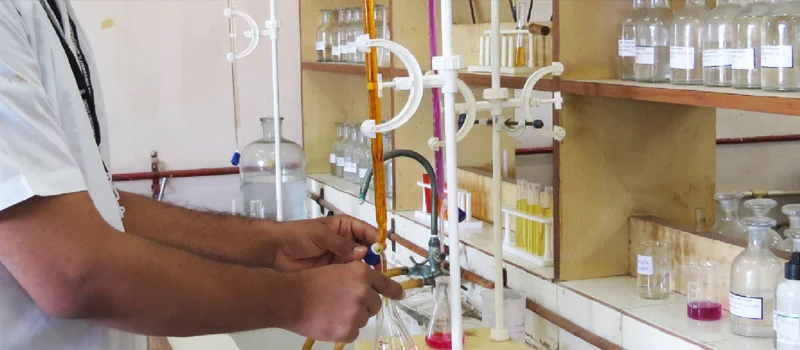
The Bachelor of Science in Chemistry (B.Sc. Chemistry) program at Ranippettai Arts, Sciences, and Management College (RASMC) offers students a comprehensive understanding of the principles of chemistry and their applications in various fields such as pharmaceuticals, agriculture, environmental science, and industrial chemistry. The program is designed to equip students with both theoretical knowledge and practical skills, preparing them for careers in chemical industries, research, and academia.
Objectives of the Program:
- Fundamentals of Chemistry: To provide students with a solid foundation in the fundamental principles of chemistry, including physical, inorganic, organic, and analytical chemistry.
- Hands-on Laboratory Experience: To develop practical skills in performing laboratory experiments, synthesizing chemical compounds, and using modern techniques and instruments.
- Applications in Industry and Research: To prepare students for careers in industries such as pharmaceuticals, chemical manufacturing, and environmental management, and to provide the necessary skills for research.
- Environmental Awareness: To create awareness of the role of chemistry in environmental protection, sustainable development, and green chemistry.
- Preparation for Higher Studies: To lay the foundation for students who wish to pursue postgraduate studies in chemistry, biochemistry, pharmaceutical sciences, or related fields.
Key Features of the B.Sc. Chemistry Program at RASMC:
1. Comprehensive Curriculum:
- The curriculum covers core topics in physical, inorganic, organic, analytical, and industrial chemistry, with a strong focus on both theory and practical application.
- Specialized subjects such as green chemistry, pharmaceutical chemistry, and materials chemistry ensure students are well-versed in contemporary areas of research and industry.
2. Hands-on Laboratory Training:
- The program includes extensive laboratory work to give students the opportunity to perform experiments, synthesize compounds, and use modern analytical instruments such as UV-Vis spectrophotometers, IR spectrometers, and chromatographs.
- Students gain practical skills in qualitative and quantitative analysis, organic synthesis, and environmental chemistry.
3. Experienced Faculty:
- The program is taught by qualified faculty members who are experts in various sub-disciplines of chemistry. The faculty members bring their research expertise to the classroom, providing students with updated knowledge and insights into the latest trends in the field.
4. State-of-the-Art Laboratories:
- The college provides modern and well-equipped laboratories with all necessary instruments for chemical analysis, synthesis, and characterization.
- Students have access to instruments for spectroscopy, chromatography, and titrations, enabling them to conduct experiments with precision.
5. Research and Innovation:
- Students are encouraged to engage in research activities, particularly during the final semester, where they work on research projects or dissertations.
- The program emphasizes critical thinking, problem-solving, and independent research, preparing students for higher studies or research-oriented careers.
6. Industry Exposure and Career Support:
- The college organizes industrial visits, guest lectures, and seminars to expose students to the practical applications of chemistry in various industries.
- The Career Development Cell at RASMC offers support in internship placements, career counseling, resume building, and interview preparation, enhancing students' employability.
7. Environmental and Social Responsibility:
- The program incorporates subjects like environmental chemistry, green chemistry, and industrial chemistry, which aim to develop students' awareness of environmental issues and the role of chemistry in sustainable development.
- Students are encouraged to think critically about the ethical and social implications of chemical research and industrial practices.

